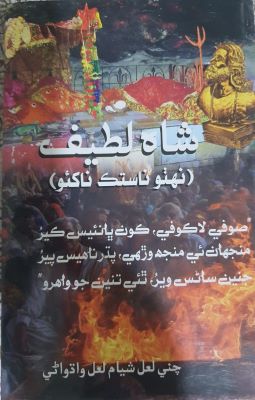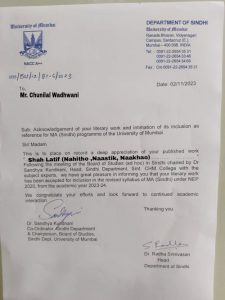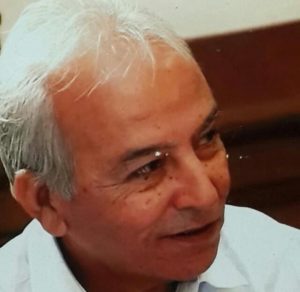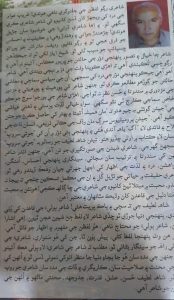
Writer explores different aspects of the life and work of Shah Abdul Latif Bhittai – a sage of his time, a great musician, singer, politician, nationalist, a role model of ethics and a person who gave message of struggle for reforming the society.
Sindh Courier Report
Mumbai
The Board of Studies, Sindhi Department, University of Mumbai, Maharashtra state India has included the book titled ‘Shah Latif – Nahitho, Naastik, Nakhao’, authored by Mr. Chunilal Wadhwani, as Reference Book for M. A. (Sindhi) program of the University of Mumbai. Some other books of Sindhi writers including a book ‘Ibaadat’, authored by Ms. Indira Shabnam, have also been accepted for the syllabus.
 In an acknowledgment letter dated November 2, 2023, addressed to Mr. Chunilal Wadhwani, Dr. Sandhya Kundnani, Coordinator and Chairperson Board of Studies, Sindhi Department, University of Mumbai has informed that following the meeting of Board of Studies with subject experts, chaired by her, the literary work (Book ‘Shah Latif – Nahitho, Naastik, Nakhao’) has been accepted for inclusion in revised syllabus of M.A. (Sindhi) from the Academic Year 2023-2024. The letter is signed by Dr. Sandhya Waswani as well as Dr. Radha Srinivasan, Head, Department of Sindh, University of Mumbai.
In an acknowledgment letter dated November 2, 2023, addressed to Mr. Chunilal Wadhwani, Dr. Sandhya Kundnani, Coordinator and Chairperson Board of Studies, Sindhi Department, University of Mumbai has informed that following the meeting of Board of Studies with subject experts, chaired by her, the literary work (Book ‘Shah Latif – Nahitho, Naastik, Nakhao’) has been accepted for inclusion in revised syllabus of M.A. (Sindhi) from the Academic Year 2023-2024. The letter is signed by Dr. Sandhya Waswani as well as Dr. Radha Srinivasan, Head, Department of Sindh, University of Mumbai.
Mr. Chunilal Shyamlal Wadhwani is based in Indore, India. His book was published in September 2022. The book includes the introduction by eminent writer Mohan Gehani who says that the poetry of Shah Latif has often been painted with religious color imprisoning it in the cage of ‘Pir Murshid and Mureeds (Disciples)’, while many scholars portrayed Bhitta as Sufi Saint. This way, the writers hailing from different schools of thought have explained the poetry according to their own perception.
Author of the book Mr. Chunilal, who was born in Jacobabad Sindh and studied at Government Primary School, Municipal High School and Government High School, secured engineering degree at Sindh University Engineering College, Jamshoro, in the preface of the book, writes, “The teachers at the primary school used to give lessons on the life and poetry of great poet Shah Abdul Latif Bhittai. During the life at college and university, I read books and articles on the poetry of Bhittai and also got inspired by the literature provided by the friends.”

“During a trip to Singapore, I attended a community program of Sindhis where an elderly speaker recited the poetry of Bhittai that related to Jogis, Hinglaj and Guru Gorakhnath etc. It made me to recall that during my student life, what the teachers taught or what the literature I read, explained just one aspect of the poetry,” he said.
Mr. Chunilal says, “On my return from Singapore, I decided to write a book exploring different aspects of the life and work of Shah Abdul Latif Bhittai – a sage of his time, a great musician, singer, politician, nationalist, a role model of ethics and a person who gave message of struggle for reforming the society.”
Mr. Chunilal begins the book stating that Shah Latif was a human being who loved the humans. He never introduced himself as Sufi or Pir Murshid. Once, Bhittai was asked, “Are you a Sunni or Shia?” And his reply was “I am between these two.”
“But there is nothing between these two,” he was told.
 “Yes, I am that ‘Nothing’” Bhittai responded.
“Yes, I am that ‘Nothing’” Bhittai responded.
What a great philosophy. Bhittai considered himself a ‘Zero’. He never preached any discrimination among the religions or beliefs nor did he claim to be a Waliullah or the Messenger. Bhittai always said, “I am a human being and love the humans.”
Author further states that in his poetry Bhittai has portrayed daily life, culture, traditions, hardships and starvation faced by the people of Sindh, the fascinating beauty of the rural areas of motherland.
The 422-page book concludes with selected verses of Bhittai and the authors remarks that ‘The poetry is more thoughtful than the philosophy’ as the Aristotle had stated centuries back. “Shah Latif has not only shed light on the difficult times of that era, but has also given a message to continue struggle despite hardships for steering oneself out of such crises.”
______________